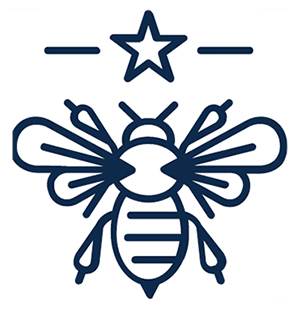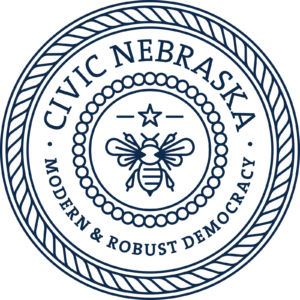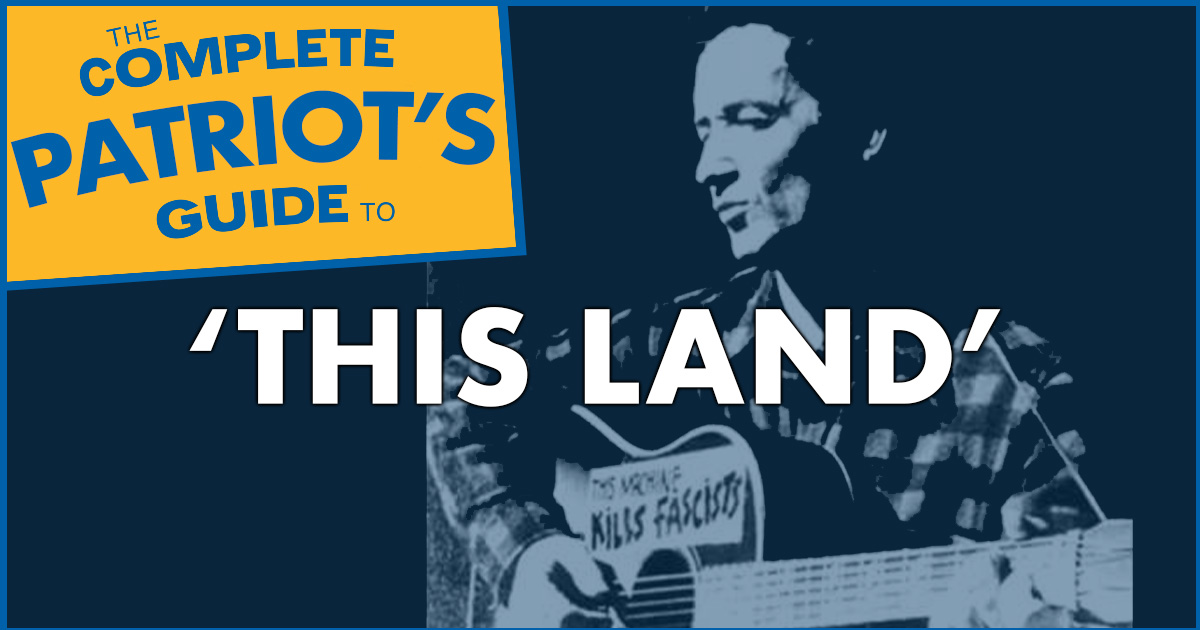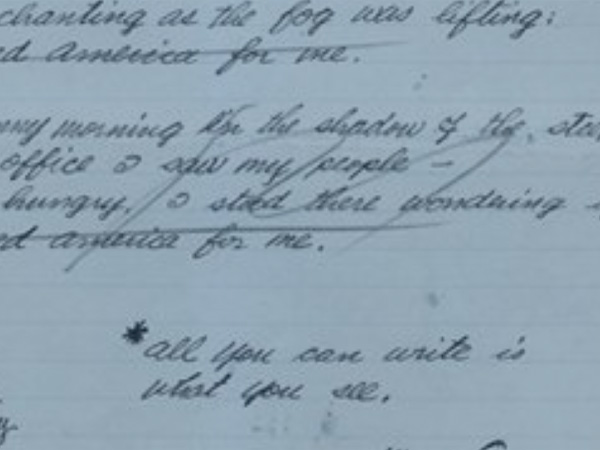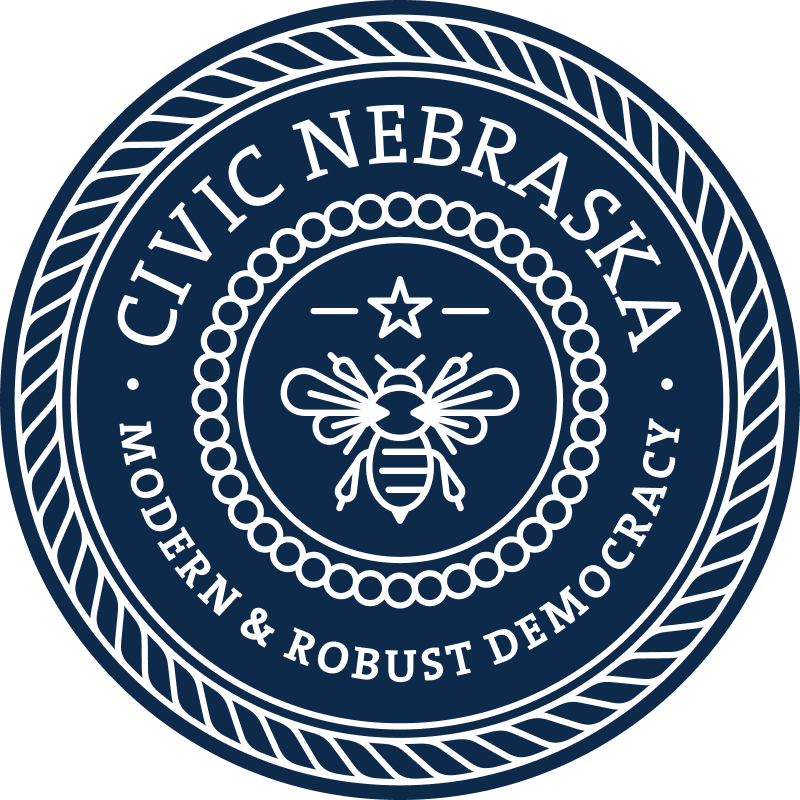In February 1940, Woody Guthrie put down the very first lyrics to what would become one of America’s most famous songs. Today, “This Land Is Your Land” is arguably our nation’s greatest, most iconic folk anthem. It’s been performed by everyone from Glen Campbell to Bruce Springsteen to Sharon Jones & The Dap-Kings. It’s been on TV, on the radio, and in the movies. And it’s sung daily by schoolchildren across our land.
Guthrie’s tune – forged by the Great Depression and intended as a caution against blind patriotism – likely persists for two reasons. First, it speaks so eloquently to our national creed of equality, justice, opportunity and community. And second, well, it’s catchy. “This Land” is set to a simple melody that grabs ahold of you and just won’t let go. All the while, the final words of the refrain, This land was made for you and me, evokes cheers, tears, and everything in between.
But those words – today, so indelible in American history and so inseparable from American life – took awhile before they took hold.
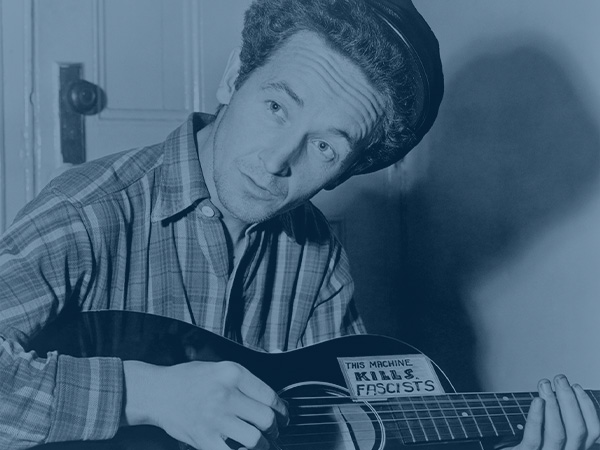
‘God Blessed America For Me’
Woodrow Wilson Guthrie was happiest when he was out on the road. In his Dust Bowl roaming and rambling, he buzzed across the American southwest, from Texas to California. In early 1940, he hitchhiked across the continent to New York City – nearly freezing to death in Philadelphia along the way, but that’s a different story. In his travels across America, he saw the self-evident beauty of the country, but he also witnessed plenty of sadness and pain.
By the time he made it to New York, Guthrie was flat-out sick of Kate Smith saturating the airwaves with her rendition of Irving Berlin’s “God Bless America.” The song was a smash hit (and has an interesting story of its own; Berlin wrote the song in 1918 but found the lyrics too sappy. He shelved it until 1938, when Smith called in search of a new song). Guthrie felt the tune was completely removed from the hard life many Americans faced amid the tenth year of the Great Depression, and on Feb. 23, 1940, he was ready to write a rejoinder.
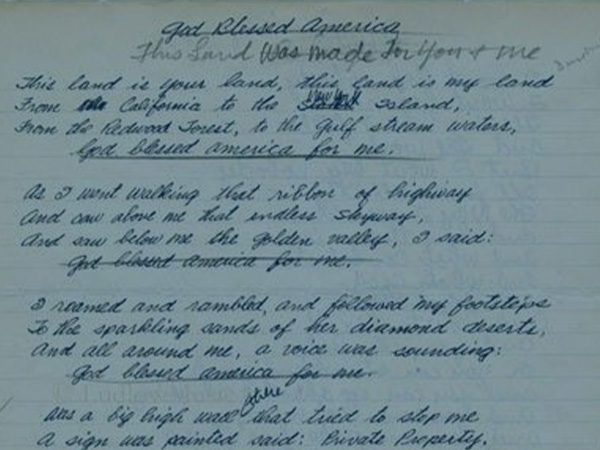
Woody Guthrie, OG SJW
Guthrie decided to celebrate an America that was vast and beautiful, but also compassionate and honest with itself. His first draft produced God Blessed America For Me – a clear shot across the bow at Berlin’s hit single, with an implication that God wasn’t the end-all be-all answer to everything that ailed the nation. His original version started with:
This land is your land, this land is my land
From California to the Staten Island,
From the Redwood Forest, to the Gulf stream waters,
God blessed America for me.
And it included two very pointed verses:
Was a big high wall there that tried to stop me
A sign was painted said: Private Property,
But on the back side it didn’t say nothing —
God blessed America for me.
One bright sunny morning in the shadow of the steeple
By the Relief Office I saw my people —
As they stood hungry, I stood there wondering if
God blessed America for me.
Then, for whatever reason, Woody scratched out the title, replaced it with “This Land Was Made For You And Me,” replaced “Staten” with “New York,” and marked or underlined the last line of each stanza to reflect the title change. Then, he put the lyrics away and didn’t touch them for the next four years.
All you can write is what you see
Maybe he got distracted. After all, he was a writing machine. The phrase All You Can Write is What You See was scrawled in the margin of Guthrie’s original lyrics for “This Land,” which sum up his prolific nature. Example: The day after writing “God Blessed America For Me (This Land),” Guthrie wrote another song called “Women’s Hats.”
What, you don’t remember the timeless classic “Women’s Hats”? Neither do we. The ditty was apparently inspired, though, by his seventh-floor view of the street below, with women walking by in their diverse headwear. It’s a lovely reminder that while the myth of Woody Guthrie is that he was a deep-thinking radical who wrote and sang about Very Important Things, not everything in his catalog was all that dramatic, layered, or insightful. Some stuff was just plain goofy.
By March 1944, Guthrie had rediscovered his song and gave it a soft reboot for what had become a much more patriotic nation on a war footing. He also cut the two verses about private property and hunger, the ones most critical of the United States.
Nice tune you got there, be a shame if something happened to it
Pete Seeger, a contemporary of Guthrie’s who probably sang “This Land Is Your Land” more than any human, often said Guthrie would write and write and write and write, and then worry later about finding a tune that worked for anything he had written that he thought might work as a song. This is most certainly the case with “This Land Is Your Land.” In this instance, Guthrie reached back to a 1934 Carter Family gospel tune called “When The World’s On Fire,” and laid his lyrics on top of it.
Take a listen. It sounds pretty darned familiar.
Everybody sing!
In the early 1950s, “This Land” became a sensation. It was published in school music books and became firmly lodged in mainstream American culture (It should be noted here that while the song was a call for unity among everyday Americans, it exhibited a common blind spot from the time regarding Native claims to the very same land). In the 1960s, with Guthrie bedridden with Huntington’s Disease, the New Folk Movement adopted it as a political anthem. Bob Dylan; The Kingston Trio; Peter, Paul, and Mary and many others cut their own versions of the tune. By 1980, Bruce Springsteen was performing it nightly on stage, lauding it as “one of the most beautiful songs ever written.” And it’s never gone away, really: Whether it’s performed in the form of rock, alt-country, Americana, even hip-hop – it doesn’t matter. The song persists.
Well, this is the United States of America, so its pervasiveness also has led to legal issues – because, you know, money! In 2004, JibJab’s viral parody featuring animated versions of then-presidential rivals John Kerry and George W. Bush prompted The Richmond Organization, which owned join copyright to the tune via subsidiary Ludlow Music, to threaten a lawsuit.
JibJab counter-sued, saying the parody was fair use, and Richmond settled with JibJab out of court – leaving parodists to rejoice from the redwood forests to the gulf stream waters.
Everything old is new again
In January 2009, Americans were suffering through a new economic crisis. The Great Recession also coincided with the election of a new president, Barack Obama, a populist who got his start as a community organizer. It was an extraordinary period that seemed fit for “This Land Is Your Land” – polling at the time showed that while most Americans felt there were tougher days ahead, the United States would emerge stronger, more united, and more empathetic. When Springsteen and Guthrie’s old pal Pete Seeger picked up their guitars at a Lincoln Memorial concert commemorating Obama’s inauguration, the song was proudly and publicly restored to its original form:
This song belongs to you and me?
In the years since, challenges over who owns “This Land” have continued. A widely circulated Guthrie quote adds to his populist mythology while also perpetuating the claim that he was against copyright protection for the song: “Anybody caught singin’ it without our permission will be mighty good friends of our’n, cause we don’t give a dern. Publish it. Write it. Sing it. Swing to it. Yodel it. We wrote it, that’s all we wanted to do.” Truth is, Guthrie said that about a different song he’d written, but hey, it still makes for a good story.
The court of law, however, requires a few more solid facts. A lawsuit was filed in 2016 to push the song fully into the public domain, but Richmond and joint copyright owner Woody Guthrie Publications, led by Guthrie’s daughter Nora, opposed the song’s release. At the time, Nora Guthrie said defense of the lawsuit was about more than money. The copyright, she said, protected the song’s message of inclusion and equality from the same patriotic jingoism her father was criticizing with his song. In February 2020, a judge agreed, striking down the fair-use challenge.
“This Land Is Your Land” – a song set to a borrowed tune that has lived through various iterations depending on the era – has come full circle. Simultaneously a love song to our country and an enduring protest against its inequalities, it remains a musical reminder that the American ideal belongs to all of us. This land was made – and could still be made – for you and me.
